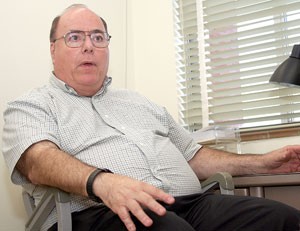Professor Q&A
Hal Arkowitz, right, is an associate professor of psychology. He has been involved in the practice of motivational interviewing for more than eight years. In addition to undergraduate courses in clinical psychology, he has been teaching a graduate-level, two-semester practicum every other year since 2000. In the course, each student sees at least two clients for eight to 10 sessions lasting 50 minutes each in which the students employ their motivational interviewing training. Arkowitz sat down to talk with the Daily Wildcat about motivational interviewing and the course – and actually initiated the conversation.
Hal Arkowitz: How many therapists does it take to change a light bulb?
Wildcat: I don’t know; how many?
A: One. But the light bulb has to really want to change. Motivational interviewing is about helping people want to change.
W: Could you tell me more about motivational interviewing?
A: (The approach) assumes that the most effective way to help people change is to increase their motivation for change. It further assumes that the therapist’s job is not to be the advocate for change and not to use techniques specifically to change people, but to try to get people motivated to change. So the motivation comes from them rather than from an external source.
W: Why do you think that’s effective?
A: There’s a lot of data to show that the more people attribute change to themselves, the more likely it is to last.
W: And how do therapists do this?
A: In motivational interviewing, we ask people not only about their reasons for wanting to change, but also their reasons for not wanting to change … The therapist listens to both sides with empathy and doesn’t try to lecture or persuade them.
W: Why is it important that therapists don’t force treatment?
A: There’s lots of research that shows the more directive the therapist’s advice, the more resistant the client becomes. Nobody likes being told what to do, even if it’s for their own good. And this approach bypasses that … by making it the client’s decision.
W: What are you trying to do with motivational interviewing?
A: We reviewed the literature a few years ago and were impressed by what we found on the effectiveness on motivational interviewing. We also saw that it had great potential for other problems, but hadn’t yet been applied to anxiety, depression, eating disorders, et cetera. One of my goals is to bring it from the alcohol, drug literature, to the more general field of psychotherapy.
W: Is there a process to motivational interviewing?
A: The first stage is preparing people to change when there’s no motivation or when there are mixed feelings or ambivalence about changing … The second stage, which is when they are ready to change, the therapist can suggest ways to change, of viewing the problem. But they do so with the attitude that the client is the expert, and the therapist is the consultant.
W: Tell us about the practicum motivational interviewing course.
A: I’m teaching motivational interviewing to advanced graduate students in the clinical psychology program. In addition to teaching it to them, they are also seeing clients for a brief course of motivational interviewing therapy.
W: Where do you get the clients?
A: From campus, from the community, from other therapists in the community who refer to us and we basically take pretty much most people and most problems. We are currently seeing people with relationship problems, depression and anxiety.
W: About how many clients do your students see per semester?
A: The first semester is training. The second semester, the goal is for them to see two clients each. I supervise each of them individually. We have weekly case conferences, and at the end they write a case report based on measurements taken before and after treatment to see whether or not it was successful.
W: Is there anywhere else on campus that has motivational interviewing?
A: (Campus Health Service) on campus has a program called Project CHAT that is specifically for people who have concerns about their drinking. They get a two-session exposure to motivational interview which would focus around their alcohol abuse. Two graduate students from our department, who have been trained in motivational interviewing, are the ones doing it, though it’s coordinated by Lynn Reyes (an alcohol and drug prevention specialist at Campus Health).
For more information, call 621-9683
For Project CHAT, call 621-4251









